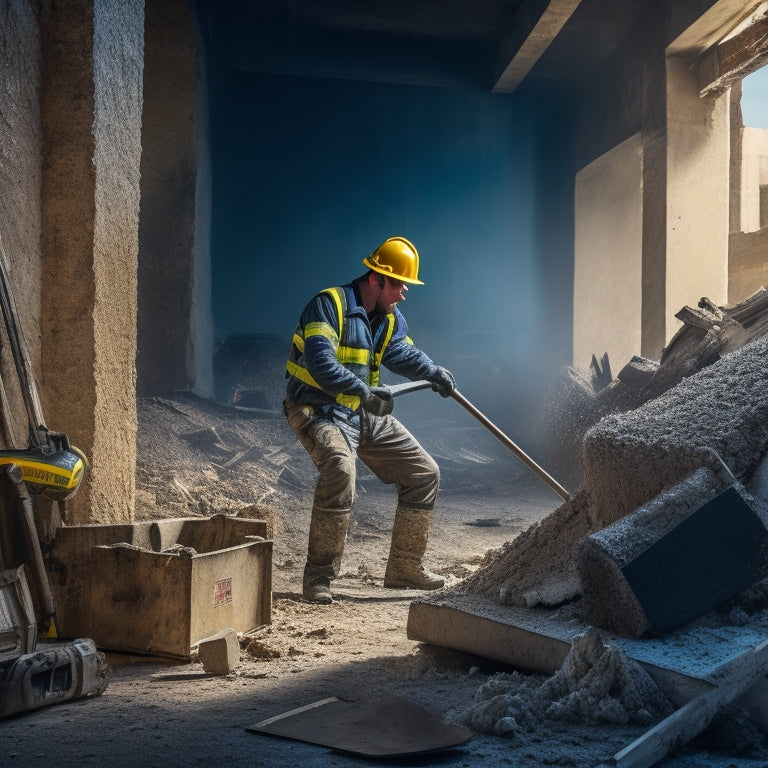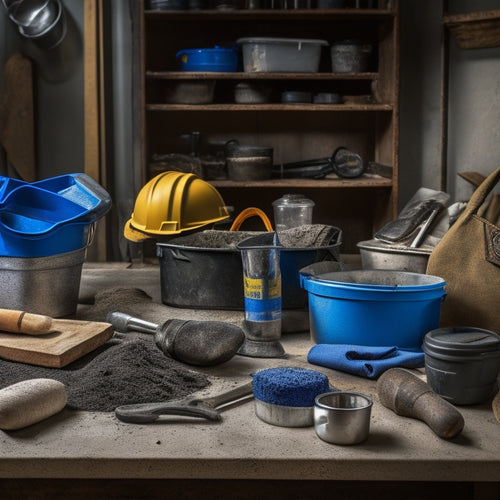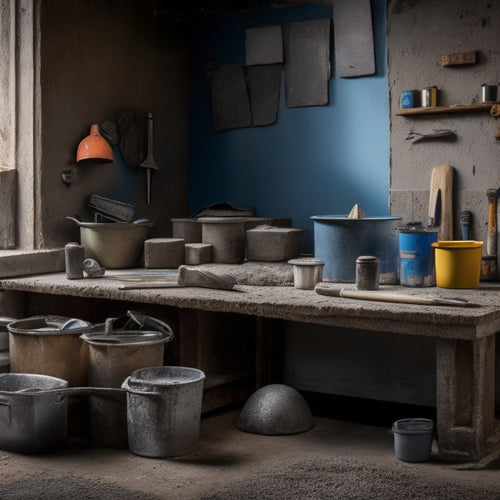
5 Best Tools for Concrete Wall Demolition
Share
When tackling concrete wall demolition, you'll need the right tools to get the job done efficiently and safely. Pneumatic breakers harness compressed air for powerful blows, ideal for tough structures, while hydraulic jackhammers are designed for heavy lifting and thick concrete. Electric demolition hammers provide precision and control for intricate tasks, and concrete crushers process massive material quickly. Handheld chiseling tools are perfect for fine-tuning in tight spaces. Each tool has its strengths and best uses. To guarantee you choose the best tool for your project and get the job done right, you'll want to evaluate the specific demands of your concrete wall demolition task.
Key Takeaways
• Pneumatic breakers harness compressed air for powerful blows, ideal for tough concrete structures and reducing operator fatigue.
• Hydraulic jackhammers are designed for heavy lifting and are effective on thick, reinforced concrete, but require careful safety precautions.
• Electric demolition hammers provide precision and control for intricate concrete demolition tasks, especially in tight spaces, with proper maintenance.
• Concrete crushers are ideal for large-scale concrete demolition, processing massive material quickly, and enabling efficient removal and disposal.
• Handheld chiseling tools excel at precision work and fine-tuning in tight spaces, with various chisel types available for specific demolition tasks.
Pneumatic Breakers for Efficient Demolition
When tackling concrete wall demolition, pneumatic breakers prove to be a reliable choice for efficient demolition. They harness compressed air to deliver powerful blows that can quickly dismantle even the toughest concrete structures.
You'll appreciate the pneumatic breaker advantages, including their ability to reduce fatigue and increase productivity. Since they don't require electricity, you can use them in areas with limited power access. Additionally, pneumatic breakers are generally lighter and more maneuverable than other demolition tools, making them ideal for working in tight spaces.
However, pneumatic breaker safety should always be your top priority. Make sure you're wearing proper protective gear, including safety glasses, ear protection, and gloves.
It's also essential to maintain a safe distance from the breaker and avoid overreaching or applying excessive pressure, which can lead to accidents. By following these guidelines and choosing the right pneumatic breaker for your project, you'll be able to efficiently and safely demolish concrete walls with ease.
Hydraulic Jackhammers for Heavy Lifting
You'll turn to hydraulic jackhammers for heavy lifting when concrete wall demolition requires sheer force and precision. These powerful tools are designed to tackle thick, reinforced concrete walls and foundations, making them an essential part of your demolition arsenal.
When choosing a hydraulic jackhammer, consider the weight and size of the unit, as well as the pressure and flow rate of the hydraulic system. This will guarantee you have the right amount of force to break through even the toughest concrete.
Remember to always wear necessary safety equipment, such as hard hats, safety glasses, and gloves, when operating a hydraulic jackhammer. Proper demolition techniques are also vital to avoid injury and damage to surrounding structures.
Make sure to consult the operator's manual and follow all safety guidelines to get the job done efficiently and effectively. With the right hydraulic jackhammer and proper training, you'll be able to tackle even the most challenging concrete demolition projects with confidence.
Electric Demolition Hammers for Precision
Electric demolition hammers provide the precision and control needed to tackle smaller, more intricate concrete demolition projects, allowing you to target specific areas with ease. When working on delicate or hard-to-reach areas, these hammers become an indispensable tool in your arsenal. With their compact size and lightweight design, you can maneuver them into tight spaces and make precise strikes without causing unnecessary damage.
To get the most out of your electric demolition hammer, it's essential to follow proper safety precautions. Always wear protective gear, including gloves, safety glasses, and a dust mask, to prevent injury from flying debris and dust. Additionally, make sure you're standing on a stable surface and maintain a firm grip on the hammer to avoid loss of control.
Regular tool maintenance is also important to extend the life of your hammer and prevent mechanical failure. Clean the hammer regularly, lubricate moving parts, and store it in a dry place to prevent rust. By following these guidelines, you'll be able to tackle even the most demanding concrete demolition projects with precision and confidence.
Concrete Crushers for Large Scale Jobs
Tackling large-scale concrete demolition projects requires the brute force of concrete crushers, which can process massive amounts of material quickly and efficiently. When you're dealing with massive concrete structures, you need a tool that can keep up with the demands of the job. Concrete crushers are designed to handle the toughest concrete demolition projects, making them an essential tool for any large-scale job.
Portable concrete crushers are particularly useful for large-scale projects, as they can be easily transported to the site and moved around as needed. This flexibility allows you to tackle complex demolition projects with ease. With advanced crushing techniques, these machines can break down concrete into manageable pieces, making it easier to remove and dispose of.
When choosing a concrete crusher, consider the size and scope of your project. Look for a crusher that can handle the volume of material you need to process, and consider the power and speed of the machine. With the right concrete crusher, you'll be able to tackle even the largest concrete demolition projects with confidence and precision.
Handheld Chiseling Tools for Detail Work
Your demolition toolkit isn't complete without handheld chiseling tools, which excel at precision work and fine-tuning in tight spaces. These tools are perfect for detail-oriented tasks, such as removing old mortar, breaking up small concrete sections, or creating decorative edges.
When it comes to handheld chiseling tools, you have several options to choose from. Here are a few popular chisel types and their uses:
| Chisel Type | Material | Best For |
|---|---|---|
| Point Chisel | Steel | Breaking up small concrete sections |
| Flat Chisel | Steel | Removing old mortar and debris |
| Claw Chisel | Steel | Demolishing small areas with precision |
| Bull Point Chisel | Steel | Breaking up hard, compacted concrete |
| Moil Point Chisel | Steel | Removing rust and debris from metal surfaces |
Remember to always wear safety equipment, such as gloves, safety glasses, and a dust mask, when working with handheld chiseling tools. They may be small, but they can still pack a punch and cause injury if not handled properly. With the right tools and safety precautions, you'll be able to tackle even the most intricate demolition tasks with ease.
Frequently Asked Questions
What Safety Gear Is Required for Concrete Wall Demolition?
When you're tackling concrete wall demolition, you'll need the right safety gear to protect yourself from debris and dust.
You'll want to wear safety goggles to shield your eyes from flying particles, and protective gloves to prevent cuts and abrasions on your hands.
Don't forget a dust mask or respirator to prevent inhaling harmful particles, and sturdy boots with good traction to prevent slips and falls.
Can I Rent Concrete Demolition Tools Instead of Buying?
You're considering renting concrete demolition tools instead of buying - a smart move.
When you crunch the numbers, a cost comparison will likely show that renting is more cost-effective, especially for one-time or infrequent projects.
Plus, rental benefits include access to specialized equipment without the long-term commitment, and you won't have to worry about maintenance or storage.
How Do I Dispose of Demolished Concrete Waste?
You've just demolished a 10,000-square-foot concrete parking lot, like the one in downtown LA, and now you're left with a massive pile of rubble.
You'll need to dispose of it efficiently. You'll have several recycling options and disposal methods to choose from.
Consider partnering with a local recycling facility to crush the concrete into reusable aggregate. Alternatively, you can haul it to a landfill, but be prepared for hefty fees.
Either way, make sure you follow local regulations to avoid penalties.
What Are the Noise Level Restrictions for Demolition Work?
When planning demolition work, you'll need to take into account noise level restrictions to avoid disturbing the surrounding environment.
Typically, local authorities set limits between 60-90 decibels during daytime hours.
To comply, you'll need to implement noise control measures, such as soundproofing techniques, like acoustic barriers or white noise generators.
You'll also want to schedule noisy tasks during less busy periods and provide warning notices to nearby residents.
Do I Need a Permit to Demolish a Concrete Wall?
You're about to take down that concrete wall like a boss, but hold up - do you need a permit to do so?
In most cases, yes, you'll need a permit for wall demolition. A million things can go wrong if you don't comply with construction regulations.
It's not just about tearing down the wall; it's about ensuring public safety and avoiding costly fines.
Check with your local authorities to determine the specific requirements for your project. Better safe than sorry!
Conclusion
So, you've made it through the demolition tool rundown and still think you're ready to take on that concrete wall? Good luck with that.
Just kidding, with the right tool, you'll be smashing through that wall like a pro. Remember, it's not about brute force, it's about using the right tool for the job.
Choose wisely, and that concrete wall won't stand a chance. Now, go forth and demolish!
Related Posts
-

5 Tools Needed for Quick Fix Concrete Mixing
You'll need five essential tools to tackle a quick fix concrete mixing project efficiently. First, you'll require a s...
-

Free Design Tools for Concrete House Planning
You can kick-start your concrete house planning project without breaking the bank, as there are several free design t...
-

Top Tools for Beginners in Concrete Masonry Coating
You're about to begin a concrete masonry coating project, and having the right tools is essential. Start with essenti...


